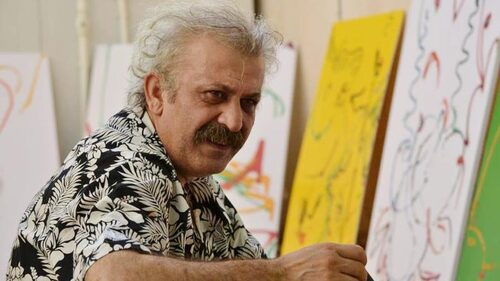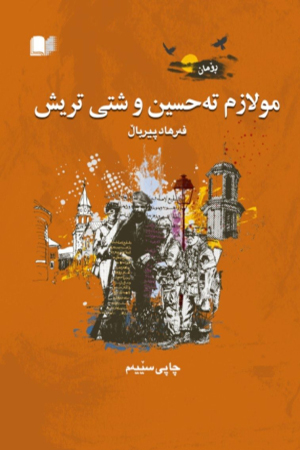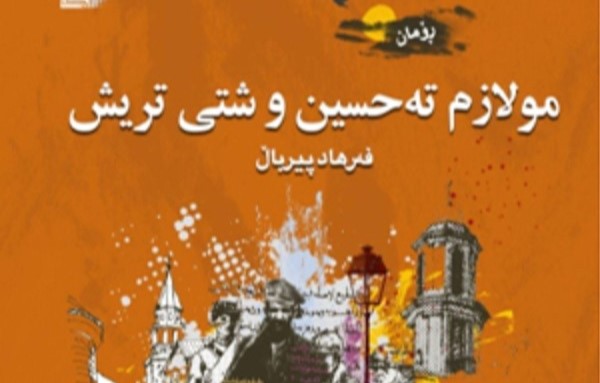Dr. Azad Mukri
The novelette of "Mulazm Tahsin and many other things" is one of the great Kurdish writers and poet's works, "Farhad Pirbal". Both in his stories and poems, Farhad Pirbal is known to be a creative writer and in most of his works, the techniques and forms he applies are bold and significant to the readers. In the novelette of Mulazm Tahsin, Pirbal has also tried to convince the reader that they are reading a well-written and technical text from the very beginning. He highlights this aim of his via the technique of narration he applies which is the two parallel lines on which the story is narrated, ending in different ways that can be predicted for the events. We will discuss this technique of writing in other articles and give up the topic here. What I would like to emphasize in this article is revealing the whole story ideologically. This story of Farhad Pirbal contains a kind of rebellion that is in line with training the Kurdish personality. As long as we have seen characters in Kurdish stories and novels, the Kurdish character has been identified in comparison to their Others. However, those Kurds who have become the enemy's spies and follow their ideology which is against the Kurdish nation and are known as Jash (a traitor) are not characterized as well as the real Kurds. In the narrations and novels, these characters are antagonists and disliked characters. This has always been the case and the oldest example is "Bakri Margawar" in the Mem and Zin story-poem written by "Ahmad Khani" and also in the folklore text of this story where he is also an antagonist who is despicable and plays an important role in the narration of this story.

In Mulazm Tahsin's novelette, in contrast to this tradition, the personality of the Kurdish main character of the story is a woman named Akhtar from Sozan. The second main character who is the antagonist is a murderous officer of the Ba'ath regime named Mulazm Tahsin. The third main character is Jwamer who is the ex-lover of Akhtar.
Most of the story is narrated while Jwamer is absent, however, he is mentioned in the neighborhood's women's discussions so the writer introduces this character and his social position and his personality characteristics through these conversations. The other two main characters, Akhtar and Mulazm Tahsin, get to know each other after one day Mulazm Tahsin comes to search Akhtar's house and this countering keeps the story alive to the last words.
At first, it is only a simple acquaintance but gradually it changes into a deep love.
On the one hand, Akhtar is still in contact with Jwamer and they still have a close relationship, and sometimes Jwamer comes down from the mountains to the city to visit Akhtar. However, he does not want to take her to the mountains with him and stay with his wife like other Peshmergas. On the other hand, he gave Akhtar a lot of the Party's statements and declarations so that she would distribute them in the city. This is a very dangerous thing to do because, in the Ba'ath regime, the only punishment considered for such an action is execution.
As the story continues, Mulazm Tahsin and Akhtar's love grows so much that he constantly asks Akhtar to escape with him and move to Baghdad so that they can live together as a married couple.
Every time the writer narrates these two characters' meetings and their dialogues, he informs the reader of Akhtar's feelings towards her murderer and her nation's enemy to a level that she gradually forgets he is Arab, an enemy, and a Ba'ath officer.
Love removes the history's veils on the dusty face of acquaintance and what is remained for Akhtar is pure light and love.
On the other hand, the society is introduced by some women in the neighborhood expressing their various opinions about the main character, Akhtar; some say she is an unethical woman from Sozan, some believe she is a spy of the Peshmerga and some assume she is Ba'ath regime's informer.
Akhtar is trapped between two loves. A Peshmerga's love who does not marry her and asks her to do risky things for their revolution and love of a Ba'ath officer who is in love with her unconditionally and wants to do anything to convince her even to give up his job.
This situation reaches a balance when the reader feels that Akhtar's feelings are gradually inclining towards Mulazm Tahsin. She continually wears makeup and pretty clothes when she is supposed to see Mulazm Tahsin, cooking Kifta (a kind of Kurdish food) for the workers and hugging him naked, … and many other things that show Akhtar's personality shifts and changes. She is about to forget about the pairs of Arab-Kurd, and Ba'ath-Peshmerga and is stepping towards her love's unity. Although she never confesses her wish to follow Mulazm Tahsin, her murderer lover, to Baghdad.

An event happens that puts all the other events of the story in an abnormal situation. This event disturbs the readers' ability to predict the end of the story.
The explosion of half a kilogram of TNT in Suleimani's market which was supposed to be left in front of a bank's entrance but it was exploded a few blocks sooner.
Immediately after this, a rich man's son is kidnapped by the Peshmerga which makes the situation even worse. Mulazm Tahsin must answer because he is responsible for Ba'ath's ideology in Suleimani and the region.
The man whose son was kidnapped and returned to him in exchange for money puts together the messy puzzle of the city's disturbances for Mulazm Tahsin. He introduces Akhtar a spy who is responsible for these events. When Mulazm Tahsin tells Akhtar all these, she confesses to everything including her love for Jwamer. Mulazim Tahsin asks her to move to Baghdad together and get married. Akhtar accepts his proposal for the first time.
They decide that he should come to Akhtar's house for the last time. He promises her that even if he sees Jwamer, he will not harm him.
Akhtar is deeply in love with Mulazm Tahsin and is ready to do everything for him. However, Mulazm Tahsin totally believes in Ba'ath ideology and is ready for revenge while he conceals all these. Finally, he cuts Jwamer's head in Akhtar's house, and as the last words he orders his soldiers: "Take this bich too, and don't leave her here." Akhtar was surrounded by armed soldiers, she was crying, and hitting her head with both hands and said:
Oh… oh… oh… Akhtar did not know more than this, she did not know what to do or say…









